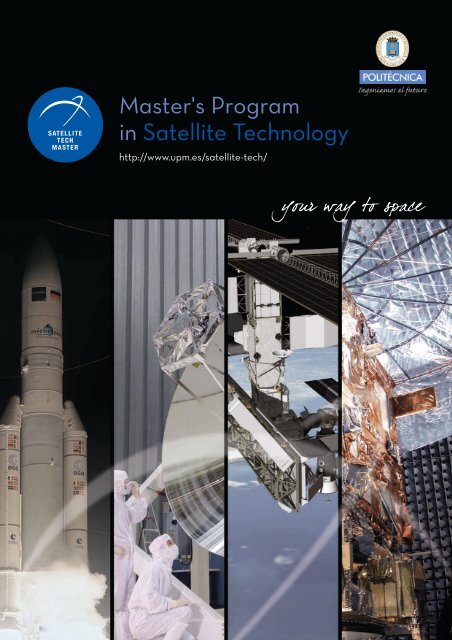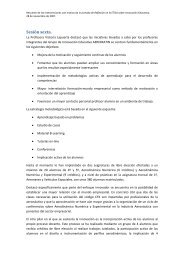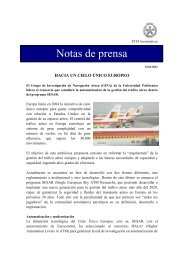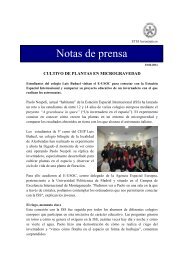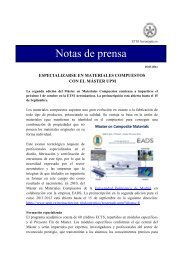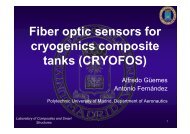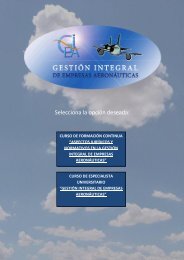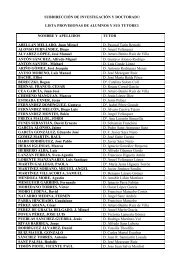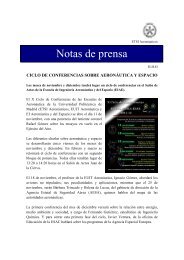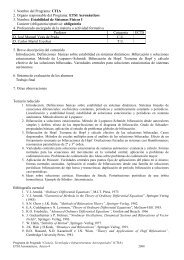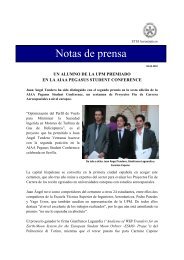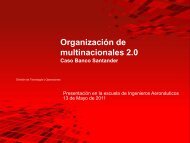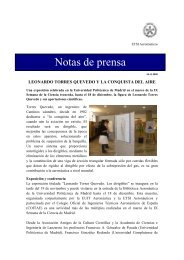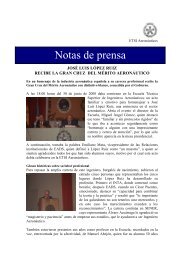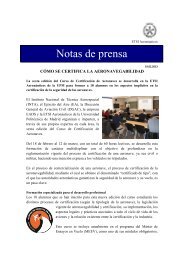Master's Program in Satellite Technology - Master in Space and ...
Master's Program in Satellite Technology - Master in Space and ...
Master's Program in Satellite Technology - Master in Space and ...
- No tags were found...
You also want an ePaper? Increase the reach of your titles
YUMPU automatically turns print PDFs into web optimized ePapers that Google loves.
<strong><strong>Master</strong>'s</strong> <strong>Program</strong><strong>in</strong> <strong>Satellite</strong> <strong>Technology</strong>http://www.upm.es/satellite-tech/
Introduction to <strong>Satellite</strong>-TechThe <strong>Satellite</strong>-Tech <strong>Master</strong> <strong>Program</strong> of the Technical University of Madrid (TU Madrid), Spa<strong>in</strong>, is an <strong>in</strong>ternational<strong>Master</strong>’s Degree designed to develop students <strong>in</strong>to competent <strong>and</strong> <strong>in</strong>terdiscipl<strong>in</strong>ary eng<strong>in</strong>eers prepared for futureeng<strong>in</strong>eer<strong>in</strong>g roles <strong>in</strong> space related <strong>in</strong>dustries, government agencies <strong>and</strong> bus<strong>in</strong>ess management. It has a strongemphasis on both theoretical <strong>and</strong> applied aspects, <strong>in</strong>clud<strong>in</strong>g practical h<strong>and</strong>s-on lab sessions held at the mostimportant space centers <strong>and</strong> companies <strong>in</strong>volved <strong>in</strong> the master.The TU Madrid <strong>Satellite</strong>-Tech <strong>Master</strong> comprises a total of 60 ECTS credits divided <strong>in</strong>to three Formative Modulesplus one f<strong>in</strong>al <strong>Master</strong> Project module. It offers a comprehensive <strong>and</strong> <strong>in</strong>tegrated curriculum, conducted <strong>in</strong> a flexiblemanner to accommodate <strong>in</strong>dividual students needs.The TU Madrid <strong>Satellite</strong>-Tech <strong>Master</strong> conta<strong>in</strong>s the experience <strong>and</strong> expertise ga<strong>in</strong>ed dur<strong>in</strong>g a decade of teach<strong>in</strong>ggraduate studies on satellite communications, remote sens<strong>in</strong>g <strong>and</strong> satellite navigation at TU Madrid. As a resultof this background, our <strong>Master</strong>’s <strong>Program</strong> has been developed <strong>in</strong> a multidiscipl<strong>in</strong>ary context <strong>in</strong>volv<strong>in</strong>g four TUMadrid Faculties <strong>and</strong> a number of <strong>in</strong>ternational lead<strong>in</strong>g <strong>in</strong>dustrial companies located <strong>in</strong> the region of Madrid,Spa<strong>in</strong>, that are top centers of space activities. Now as ever, it is our commitment <strong>and</strong> our goal to offer the besteducation <strong>in</strong> a practical, useful <strong>and</strong> challeng<strong>in</strong>g manner. All participants <strong>in</strong> the <strong>Master</strong> will have the occasion to<strong>in</strong>teract with outst<strong>and</strong><strong>in</strong>g <strong>in</strong>structors <strong>and</strong> experts from both the Academia <strong>and</strong> the Industry <strong>and</strong> <strong>Space</strong> Organizations,learn<strong>in</strong>g from their professional experiences <strong>and</strong> work<strong>in</strong>g together <strong>in</strong> a current real project.After completion of all courses, students have to develop a <strong>Master</strong> Project by work<strong>in</strong>g <strong>in</strong> a space related facilityfrom one of the participat<strong>in</strong>g companies or by tak<strong>in</strong>g part <strong>in</strong> a task group conducted by one of the most <strong>in</strong>fluentialsenior managers <strong>in</strong> the space sector, who has directly led a number of key satellite projects, from the first phaseto the exploitation phase. In this case, students will work together <strong>in</strong> a satellite mission analysis <strong>and</strong> will be<strong>in</strong>volved with the different phases of a typical space project.Another remarkable issue of the <strong>Master</strong> <strong>Program</strong> is its modularity, so students <strong>in</strong>terested <strong>in</strong> gett<strong>in</strong>g an accuratespecialization on a certa<strong>in</strong> subject may choose to attend any of the courses offered <strong>in</strong> the <strong>Master</strong> FormativeModules. Academic credits obta<strong>in</strong>ed <strong>in</strong> this way may later be applied towards the <strong>Master</strong> degree. On top of that,students who successfully pass the <strong>Master</strong> Courses <strong>and</strong> the <strong>Master</strong> Project will obta<strong>in</strong> an accredited <strong>Master</strong>’sDegree <strong>in</strong> <strong>Satellite</strong> <strong>Technology</strong> awarded by the Technical University of Madrid.About TU MadridThe TU Madrid is located <strong>in</strong> the city of Madrid, the capital of Spa<strong>in</strong> <strong>and</strong> the political <strong>and</strong> f<strong>in</strong>ancial center of thecountry. It is a modern metropolis with a vibrant economic <strong>and</strong> cultural life, <strong>and</strong> the prime European hub toLat<strong>in</strong> America. The region of Madrid receives two thirds of all foreign <strong>in</strong>vestment com<strong>in</strong>g <strong>in</strong>to Spa<strong>in</strong>, <strong>and</strong> it is alsothe source of two thirds of Spanish <strong>in</strong>vestment go<strong>in</strong>g abroad.Thanks to those figures, TU Madrid ranks first among Spanish universities <strong>in</strong> Europe R&D fund<strong>in</strong>g, hav<strong>in</strong>g around15% of the total number of European Union funded projects such as FP (Framework <strong>Program</strong>), EUREKA <strong>and</strong> ESAheld <strong>in</strong> Spa<strong>in</strong>.There are four Schools <strong>in</strong>volved <strong>in</strong> the organization <strong>and</strong> runn<strong>in</strong>g of the <strong>Satellite</strong> Tech <strong>Master</strong>’s <strong>Program</strong>, allbelong<strong>in</strong>g to the Technical University of Madrid: EUIT de Telecomunicación, ETSI Aeronáuticos, ETSI Topografía,Geodesia y Cartografía <strong>and</strong> Facultad de Informática. They all will have an active participation <strong>in</strong> the <strong>Master</strong>through their own Professors <strong>and</strong> Lectures. More <strong>in</strong>formation about TU Madrid at: http://www.upm.es/Characteristics of the <strong>Master</strong>’s <strong>Program</strong>• Well suited for graduate students work<strong>in</strong>g <strong>in</strong> space related fields• All phases of space missions <strong>and</strong> all services provided are covered• Every element <strong>in</strong> a space system architecture is deeply studied thanks to specialized experts• With the participation of the ma<strong>in</strong> companies <strong>and</strong> <strong>in</strong>stitutions work<strong>in</strong>g <strong>in</strong> the space sector• Structured <strong>in</strong> a modular manner to facilitate the specialization <strong>in</strong> a subject <strong>and</strong> to letthe possibility of accumulat<strong>in</strong>g credits• Classes scheduled dur<strong>in</strong>g even<strong>in</strong>gs to comb<strong>in</strong>e study with other bus<strong>in</strong>ess activities• A remarkable on-the-ground, h<strong>and</strong>s-on experience is <strong>in</strong>cluded with practical sessions<strong>in</strong> the facilities of the ma<strong>in</strong> space companies• <strong>Master</strong> Project carried out at one of the space companies or <strong>in</strong>volved <strong>in</strong> a task groupunder the supervision of a senior manager
<strong>Master</strong>’s <strong>Program</strong> StructureFirst Term Fundamental Courses Courses to match the level of the students,<strong>in</strong>troduc<strong>in</strong>g fundamentals <strong>in</strong> aeronautics,telecommunications <strong>and</strong> managementSecond Term Advanced Courses Courses for upgrad<strong>in</strong>g skills as well as forcatch<strong>in</strong>g up with the modern technicalknowledge related to space technologyThird Term Specialized Courses Courses which are aimed at those who wishto obta<strong>in</strong> a specialization <strong>in</strong> some specificfield of space technologyForth Term <strong>Master</strong> Project It consists on a real-world work project carriedout by apply<strong>in</strong>g a project based learn<strong>in</strong>gmethodology<strong>Master</strong>’s <strong>Program</strong> StructureCourses <strong>in</strong>cluded <strong>in</strong> the TU Madrid <strong>Satellite</strong>-Tech <strong>Master</strong> can be took by follow<strong>in</strong>g two different modes:the <strong>Master</strong> Mode <strong>and</strong> the Cont<strong>in</strong>uous Education Mode. The <strong>Master</strong> Mode requires to pass, at least,12 ECTS credits of the Fundamental Courses Module, 20 ECTS credits of the Advanced Courses Module,16 ECTS credits of the Specialized Courses Module, <strong>and</strong> to do a F<strong>in</strong>al <strong>Master</strong> Project equivalent to 12ECTS credits.Cont<strong>in</strong>uous Education Mode is designed, <strong>in</strong>stead, as an educative upgrad<strong>in</strong>g option for students whohave an <strong>in</strong>terest on a particular space-related topic. In this case, students can be enrolled <strong>in</strong> coursesof <strong>in</strong>terest to them if there are available places.• Fundamental Courses will take 36 hours each one, <strong>in</strong>clud<strong>in</strong>g next activities:• Lectures: 24 hours (6 days)• H<strong>and</strong>s-on activities or cases of study: 12 hours (3 days)• Advanced Courses will take 48 hours each one, <strong>in</strong>clud<strong>in</strong>g next activities:• Lectures: 24 hours (6 days)• Lab activities: 16 to 24 hours (4 to 6 days)• H<strong>and</strong>s-on activities: the rest up to 48 hours (0 to 2 days)• Specialized Courses will take 48 hours each one, <strong>in</strong>clud<strong>in</strong>g next activities:• Lectures: 24 hours (6 days)• Lab activities: 12 to 24 hours (3 to 6 days)• Cases of study: the rest up to 48 hours (0 to 3 days)
Fundamental Courses (FC)This part of the <strong>Master</strong>’s <strong>Program</strong> comprises 12 ECTS, which are given dur<strong>in</strong>g the first term. It consists of four courses,<strong>in</strong>troduc<strong>in</strong>g fundamentals on telecommunications, aeronautics <strong>and</strong> management, selected among five offered. Theyare planned to match the level of students’ learn<strong>in</strong>g <strong>and</strong> contribute to better underst<strong>and</strong> advanced <strong>and</strong> specializedcourses that come afterwards.CSFCCommunication Systems3 ECTSTopics related to signals <strong>and</strong> spectra, cod<strong>in</strong>g <strong>and</strong>modulation, basic l<strong>in</strong>k eng<strong>in</strong>eer<strong>in</strong>g <strong>and</strong> electromagneticspectrum are <strong>in</strong>cludedSPFCSignal Process<strong>in</strong>g3 ECTSThis course <strong>in</strong>volves digital signal process<strong>in</strong>g appliedto navigation receivers as well as radar <strong>and</strong> imageprocess<strong>in</strong>gICFCInstrumentation & Control3 ECTSThis course <strong>in</strong>troduces field <strong>in</strong>strumentation <strong>and</strong>aerospace sensors <strong>and</strong> how they are modeled <strong>and</strong>calibratedSSFC<strong>Space</strong> Science & Eng<strong>in</strong>eer<strong>in</strong>g3 ECTSThis course describes most all of the various scientifictopics that are concerned with the study of thespace environmentSBFC<strong>Space</strong> Bus<strong>in</strong>ess Management3 ECTSTopics related with economics <strong>and</strong> bus<strong>in</strong>essmanagement of space <strong>in</strong>dustry, <strong>in</strong>clud<strong>in</strong>g the operationof services relatedAdvanced Courses (AC)Advanced Courses comprise five compulsory subjects, with 4 ECTS credits each, which are given dur<strong>in</strong>g the secondterm of the <strong>Master</strong>. They are related to key elements of space systems, cover<strong>in</strong>g the space <strong>and</strong> ground segments <strong>and</strong><strong>in</strong>clud<strong>in</strong>g a specific treatment of the communication channel <strong>in</strong> between. Two subjects on orbital mechanics <strong>and</strong> spaceproject management complete this part.OMACOrbital Mechanics4 ECTSTopics related to Astrodynamics, with focus ontrajectories, perturbations, determ<strong>in</strong>ation, maneuvers<strong>and</strong> other matters relatedSSAC<strong>Space</strong> Segment4 ECTSIt comprises those subsystems on board the spacevehicle <strong>and</strong> the payload <strong>in</strong>cluded, depend<strong>in</strong>g on themissionGSACGround Segment4 ECTSIt is related to the means <strong>and</strong> resources to manage<strong>and</strong> control the mission <strong>and</strong> to receive <strong>and</strong> processthe dataSLAC<strong>Space</strong> L<strong>in</strong>k4 ECTSIt <strong>in</strong>volves l<strong>in</strong>k budget analysis, multiple accesstechniques, data process<strong>in</strong>g, multibeam systems <strong>and</strong>others topics relatedSPAC<strong>Space</strong> Project Management4 ECTSCourse <strong>in</strong>tended for all those <strong>in</strong>terested <strong>in</strong> theoperational <strong>and</strong> management aspects of spaceprojects
Specialized Courses (SC)Specialized Courses comprises four subjects with 4 ECTS each one, selected among five offered, which are givendur<strong>in</strong>g the third term. These courses are aimed at those who wish to ga<strong>in</strong> an underst<strong>and</strong><strong>in</strong>g <strong>in</strong> key markets of spaceeng<strong>in</strong>eer<strong>in</strong>g. Systems <strong>in</strong>volved <strong>and</strong> services developed by means of those are studied. A course on satellite operationshas also been <strong>in</strong>cluded.SCSC<strong>Satellite</strong> Communications4 ECTSCourse focused on satellite communication systems <strong>and</strong>services provided, with special emphasis on broadb<strong>and</strong>communicationsSNSC<strong>Satellite</strong> Navigation4 ECTSCourse focused on satellite navigation systems <strong>and</strong>services provided, with special emphasis on GALILEORSSCRemote Sens<strong>in</strong>g4 ECTSCourse focused on satellite remote sens<strong>in</strong>g <strong>and</strong> servicesprovides, with special emphasis on GMESSMSCScientific Missions4 ECTSCourse focused on space scientific missions <strong>and</strong> thetechnology <strong>in</strong>volved, with special emphasis on<strong>in</strong>strumentationSOSC<strong>Satellite</strong> Operations4 ECTSThis course is <strong>in</strong>volved with the activities related to spacemission operations, <strong>in</strong>clud<strong>in</strong>g every space segmentsubsystem<strong>Master</strong> Project (MP)When possible, it will consist on a work period at a participat<strong>in</strong>g company to carry out a real project. This activitywill be done under the supervision of a senior eng<strong>in</strong>eer <strong>in</strong> the facilities of the company. The topic for this project willbe decided by agreement between the student, the supervisor <strong>in</strong> the participat<strong>in</strong>g company <strong>and</strong> the student’s tutor.It comprises a total of 12 ECTS to be realized at the end of the <strong>Master</strong>.
2010 <strong>Master</strong>’s CalendarThe 2010 TU Madrid <strong>Satellite</strong>-Tech <strong>Master</strong> edition will start with a Welcome Meet<strong>in</strong>g by the second week of January2010. Fundamental Courses will start on January 18, 2010, Advanced Courses will start on April 12, 2010, <strong>and</strong>Specialized Courses will start on September 13, 2010. The <strong>Master</strong> Project might be done by groups or by an <strong>in</strong>dividualdur<strong>in</strong>g 2010 or 2011.Every <strong>Master</strong> Course will be scheduled one day a week. All classes will take place <strong>in</strong> the even<strong>in</strong>g, from 5 pm to 9 pm,Mondays to Thursdays, <strong>and</strong> 4 pm to 8 pm, on Fridays. Classes will be located at the TU Madrid University City Campus<strong>and</strong> at the TU Madrid South Campus, as well as at some <strong>in</strong>ternational centers of space activity <strong>in</strong> Madrid area.First Term Second Term Third TermJAN 182010FundamentalCoursesAPR 122010AdvancedCoursesSEP 132010SpecializedCoursesDEC 12009Reg. Period<strong>Master</strong> ProjectJUL 12010 Reg. PeriodAdmissionA first registration period for the 2010 TU Madrid <strong>Satellite</strong>-Tech master edition, either to the <strong>Master</strong> Mode or to theCont<strong>in</strong>uous Education Mode will be opened from December 1 to December 30, 2009. A second registration periodwill be opened from July 1 to July 30, 2010, only for students enroll<strong>in</strong>g to the Cont<strong>in</strong>uous Education Mode. Any case,a 24 hours-7 days a week pre-registration application form is available at the <strong>Satellite</strong>-Tech <strong><strong>Master</strong>'s</strong> webpage for yourconvenience.Number of places available is limited to 24 for all <strong>Master</strong> courses. C<strong>and</strong>idates should have a graduate degree <strong>in</strong> afield related to the <strong>Master</strong>’s program. The <strong>Master</strong> Academic Committee reserves the right to admission.<strong>Master</strong>’s Tuition Fees <strong>and</strong> ChargesThe TU Madrid <strong>Satellite</strong>-Tech <strong>Master</strong> offers the best price to quality ratio <strong>in</strong> Postgraduate Studies on <strong>Space</strong> <strong>Technology</strong>.Registration for <strong>in</strong>dividual courses <strong>in</strong> the Cont<strong>in</strong>uous Education Mode will be opened, depend<strong>in</strong>g on availability after<strong>Master</strong>’s enrollment process.<strong>Master</strong> ModeOne Time Payment: 8.000 €, total feeCharged on December registration periodPayment <strong>in</strong> 2-Installments: 4.100 €, each oneCharged on December <strong>and</strong> July registration periodCont<strong>in</strong>uousEducation Mode250 € per ECTSCharged on December or Julyregistration period
<strong>Master</strong>’s FacultyThe TU Madrid <strong>Satellite</strong>-Tech <strong>Master</strong> has a remarkable faculty, which is composed of outst<strong>and</strong><strong>in</strong>g <strong>in</strong>structors,researchers, experts <strong>and</strong> professors, from both the Academia <strong>and</strong> the Industry <strong>and</strong> <strong>Space</strong> Organizations.They all use advanced tra<strong>in</strong><strong>in</strong>g techniques <strong>and</strong> <strong>in</strong>novative educational methods to get the best learn<strong>in</strong>g for theirstudents.Cases of Study will be expla<strong>in</strong>ed by space specialists who are enrolled <strong>in</strong> the development of present spacesystems <strong>and</strong> services. Lab Activities will be carried out <strong>in</strong> both TU Madrid laboratories <strong>and</strong> space <strong>in</strong>dustry facilities<strong>in</strong> Madrid. The teach<strong>in</strong>g language will be Spanish or English, depend<strong>in</strong>g on lecturers <strong>and</strong> students nationality.Academic CommitteeThere is an Academic Coord<strong>in</strong>ator responsible for each fundamental, advanced <strong>and</strong> specialized course.They have developed the study plan <strong>and</strong> have selected the lecturers <strong>and</strong> <strong>in</strong>structors <strong>in</strong>volved. An AcademicManager has also been designated to organize the <strong>Master</strong> adm<strong>in</strong>istrative activities. All <strong>Master</strong>’s students willhave an academic supervisor from one of the organiz<strong>in</strong>g faculties or participat<strong>in</strong>g companies.Academic Coord<strong>in</strong>ators (First Term)CSFC - Communication SystemsMr. Francisco J. Arqués Orobón. Professor, TU MadridICFC - Instrumentation & ControlDr. Mariano Ruiz González. Professor, TU MadridSSFC - <strong>Space</strong> Science & Eng<strong>in</strong>eer<strong>in</strong>gDr. Gustavo Alonso Rodrigo. Professor, TU MadridSPFC - Signal Process<strong>in</strong>gDr. Pedro Gómez Vilda. Professor, TU MadridSBFC - <strong>Space</strong> Bus<strong>in</strong>ess ManagementMs. Miriam Catalán de Dom<strong>in</strong>go. Telecom Eng<strong>in</strong>eer,Thales Alenia <strong>Space</strong>Mr. José Antonio Guerra Expósito. Telecom Eng<strong>in</strong>eer,21NetAcademic Coord<strong>in</strong>ators (Second Term)OMAC - Orbital MechanicsMr. Miguel Ángel Serrano Ortega. AeronauticEng<strong>in</strong>eer, HISDESATDr. Manuel Pérez Cortés. Ph. D. <strong>in</strong> AeronauticalEng<strong>in</strong>eer<strong>in</strong>g, GMVGSAC - Ground SegmentMs. M. de la Palma García Hernández. TelecomEng<strong>in</strong>eer, Indra EspacioSSAC - <strong>Space</strong> SegmentDr. Isabel Pérez Gr<strong>and</strong>e. Professor, TU MadridSLAC - <strong>Space</strong> L<strong>in</strong>kDr. Rafael Herradón Díez. Professor, TU MadridSPAC - <strong>Space</strong> Project ManagementMr. Álvaro Urech Baqué. M. Sc. Physics, INECOAcademic Coord<strong>in</strong>ators (THIRD Term)SCSC - <strong>Satellite</strong> CommunicationsMr. Pedro P<strong>in</strong>tó Marín. Telecom Eng<strong>in</strong>eer, HISPASATRSSC - Remote Sens<strong>in</strong>gMs. Mónica López López. Agronomic Eng<strong>in</strong>eer, CDTISOSC - <strong>Satellite</strong> OperationsMr. Miguel Ángel Serrano Ortega. Aeronautic Eng<strong>in</strong>eer,HISDESATSNSC - <strong>Satellite</strong> NavigationDr. Abelardo Bethencourt. Professor, TU MadridSMSC - Scientific MissionsDr. Ana Laverón Simavilla. Professor, TU MadridDirectorDr. Antonio Pérez YusteProfessor, TU Madrid<strong>Master</strong>’s Directive StaffSecretaryMr. Pedro P<strong>in</strong>tó MarínTelecom Eng<strong>in</strong>eer, HISPASATAcademic ManagerDr. Florent<strong>in</strong>o Jiménez MuñozProfessor, TU Madrid
Participat<strong>in</strong>g CompaniesSponsor<strong>in</strong>g CompaniesThales Alenia <strong>Space</strong>, Indra Espacio, Hisdesat, GMV, SENER, INSA,EADS Casa Espacio, HISPASATCollaborat<strong>in</strong>g CompaniesRhode & Schwarz, CentumAffiliated InstitutionsCDTI, INTAContact Information<strong>Satellite</strong>-Tech <strong>Program</strong> OfficeDepartamento IAC, EUITTCampus Sur, UPMCtra. Valencia, Km. 7 · 28031 Madrid, Spa<strong>in</strong>Tel: +34 91 336 7791 / Fax: +34 91 336 7784e-mail: satellite-tech@upm.esRegistration:http://www.upm.es/satellite-tech/admissions/


